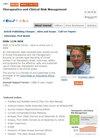The Potential of Autologous Platelet-Rich Plasma Gel for Diabetic Foot Ulcer Care Among Older Adults: A Systematic Review and Meta-Analysis
IF 2.8
3区 医学
Q1 Pharmacology, Toxicology and Pharmaceutics
引用次数: 0
Abstract
Introduction: Poorly controlled diabetes mellitus can lead to the development of diabetic foot ulcers (DFU), which is a frequent complication in patients. However, several diabetes management guidelines for older adults do not mention the occurrence of DFUs. Nowadays, Autologous Platelet-Rich Gel (APG) is being used for treating diabetic ulcers. APG is an innovative platelet-derived product with many advantages, such as being low-cost, easy to produce, and readily available materials. Additionally, it does not lead to any rejection reaction.Objective: This study aims to assess the safety and efficacy of APG as a novel treatment of DFU compared with standard treatment in older adult patients.
Methods: Randomized Controlled Trials (RCTs) were searched using PubMed, Cochrane, Google Scholar, Wiley, and PlosOne. The keywords have been arranged using the Boolean operator, including autologous platelet-rich gel, DFU, and elderly. The data was screened by inclusion and exclusion criteria. The final inclusion study was analyzed and synthesized by tabulation, clusterization, contextual and thematic approach, and assessed for risk of bias using ROB 2.0. Meta-analysis was conducted by using Review Manager 5.4 and the Mantel Haenszel method.
Results: Eight RCTs with 598 patients were eligible for the present analysis. Compared with standard care/conventional treatment, APG could significantly improve the healing wound in patients with diabetic foot ulcers (Relative risk (RR) 1.32, 95% confidence interval (CI) 1.22– 1.57, p < 0.0001), shortened the healing time (Mean difference [MD] − 16.97 days (95% CI: − 32.64 to − 1.29; p < 0.00001), shortened the length of hospital stay (MD= − 20.11, 95% CI: − 38.02, − 2.20; p = 0.03), and amputation rate (MD= 0.36, 95% CI: 0.16, 0.84; p = 0.02).
Conclusion: APG treatment can better treat DFU in terms of duration of healing, wound healing, length of hospital stay, and amputation prevention than the standard treatment.
Keywords: autologous platelet-rich plasma gel, diabetic foot ulcers, older adult
自体富血小板血浆凝胶治疗老年人糖尿病足溃疡的潜力:系统回顾与元分析
导言:糖尿病控制不佳会导致糖尿病足溃疡(DFU)的发生,这是患者经常出现的并发症。然而,一些针对老年人的糖尿病管理指南并未提及糖尿病足溃疡的发生。如今,自体富血小板凝胶(APG)正被用于治疗糖尿病溃疡。自体富血小板凝胶是一种创新的血小板衍生产品,具有成本低、易于生产、材料易得等诸多优点。此外,它还不会导致任何排异反应:本研究旨在评估 APG 作为一种新型的 DFU 治疗方法与老年患者标准治疗方法相比的安全性和有效性:方法:使用 PubMed、Cochrane、Google Scholar、Wiley 和 PlosOne 搜索随机对照试验 (RCT)。使用布尔运算符排列关键词,包括自体富血小板凝胶、DFU 和老年人。根据纳入和排除标准对数据进行筛选。通过制表、聚类、上下文和主题方法对最终纳入的研究进行分析和综合,并使用 ROB 2.0 评估偏倚风险。使用 Review Manager 5.4 和 Mantel Haenszel 方法进行 Meta 分析:共有 8 项 RCT,598 名患者符合本次分析的条件。与标准护理/常规治疗相比,APG能显著改善糖尿病足溃疡患者的伤口愈合情况(相对风险(RR)1.32,95% 置信区间(CI)1.22- 1.57,p <0.0001),缩短愈合时间(平均差[MD] - 16.97天 (95% CI: - 32.64 to - 1.29; p < 0.00001),缩短了住院时间(MD= - 20.11, 95% CI: - 38.02, - 2.20; p = 0.03)和截肢率(MD= 0.36, 95% CI: 0.16, 0.84; p = 0.02):自体富血小板血浆凝胶治疗在愈合时间、伤口愈合、住院时间和预防截肢方面均优于标准治疗。
本文章由计算机程序翻译,如有差异,请以英文原文为准。
求助全文
约1分钟内获得全文
求助全文
来源期刊

Therapeutics and Clinical Risk Management
HEALTH CARE SCIENCES & SERVICES-
CiteScore
5.30
自引率
3.60%
发文量
139
审稿时长
16 weeks
期刊介绍:
Therapeutics and Clinical Risk Management is an international, peer-reviewed journal of clinical therapeutics and risk management, focusing on concise rapid reporting of clinical studies in all therapeutic areas, outcomes, safety, and programs for the effective, safe, and sustained use of medicines, therapeutic and surgical interventions in all clinical areas.
The journal welcomes submissions covering original research, clinical and epidemiological studies, reviews, guidelines, expert opinion and commentary. The journal will consider case reports but only if they make a valuable and original contribution to the literature.
As of 18th March 2019, Therapeutics and Clinical Risk Management will no longer consider meta-analyses for publication.
The journal does not accept study protocols, animal-based or cell line-based studies.
 求助内容:
求助内容: 应助结果提醒方式:
应助结果提醒方式:


